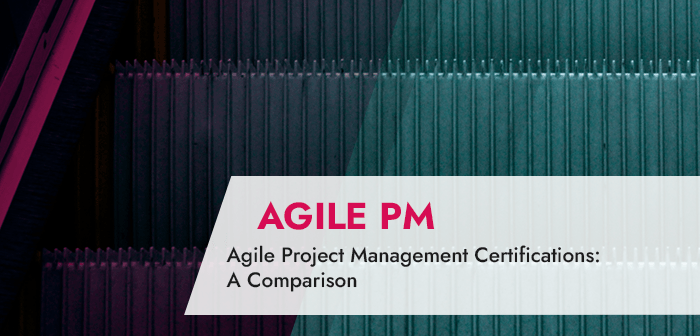Our world is becoming ever more complex, interconnected and dynamic. Predicting developments is becoming more and more difficult. As a result, agile project management is growing in importance. The same goes for the respective methods and agile project management certifications.
In the future, working on projects will require a clearer focus on the business value, innovative strength and creativity as well as shorter, yet still solid planning horizons. Companies are implementing this change which is evident from the emergence of, and request for, new agile job descriptions. Agile project management certificates play a role in this context.
What you will find out in this article:
- New job descriptions emerging through agile project management
- Why Scrum certifications make sense
- Further approaches and certificates for agile project management
- Overview of key agile certifications
- Which agile PM certification is right for you?
- Conclusion – Agile PM certifications
Let us get started!
New Job Descriptions through Agile Project Management
Did you know that Scrum Master and increasingly Product Owner are turning into fully-fledged job titles?
Originating in the name of a role in the Scrum team, these terms are explicitly used in job advertisements more and more often. Moreover, companies are including these terms in the career path for employees.
Subscribe to the TPG Blog Newsletter now and never miss another blog post.
As in every field, the candidate’s experience is key. It must not be underestimated. Beyond professional experience, Scrum Masters require the below skills in their highly mediatory and supportive role:
- Knowledge of human nature
- Tact
- Ability to moderate
- Conflict resolution skills
Special Download: Agile, Traditional or Hybrid Project Management? (PDF file)
Please fill in the form.
* Required Fields | Data Protection
Why Scrum Certifications Make Sense
In and around Scrum, there are countless misunderstandings. The successful introduction of the methods is also hugely dependent on the participants’ stock of knowledge.
This is why the basics of agile project management certifications, such as the Professional Scrum Master I by Scrum.org or the Scrum Alliance’s Certified Scrum Master, can be very helpful.
These two certifications are meant for those starting out in agile methods. Certificate holders indicate that they have understood the fundamental principles of the Scrum Framework and have demonstrated this in an exam.
By means of one of the above certifications, they furthermore show their readiness to:
- lead and support others in such a role.
- help the organization implement Scrum.
- gain more experience with Scrum.
The last point is particularly relevant if you are still at the beginning of your Scrum career.
Your agile project management certifications will demonstrate that, as a Scrum-Master-to-be or an active Scrum Master:
- You are familiar with the relevant contents of the Scrum Guide and further literature.
- You have demonstrated this knowledge in an exam situation.

Further Approaches and Certificates for Agile Project Management
Excellent Scrum Masters do not limit themselves to Scrum alone. There is a variety of agile methods and approaches. They can be combined and have many aspects in common. For example, many methods are based on the following:
- A trusting and open concept of man
- An iterative-incremental method of operation
If in doubt whether a project needs an agile, traditional or hybrid approach, read this article.
Moreover, there are environment issues in organizations to which agile methods often pay little attention. For instance, we could name the following here:
- Portfolio management
- Resource management
- Project selection methods
- Organizational structuring
- etc.
All this takes us back from product development at individual team level for which Scrum was primarily developed to project management issues. This requires a more holistic and higher-level perspective on things.
This is where the PMI-ACP® (“Project Management Institute Agile Certified Practitioner”) comes in.
PMI Agile Certified Practitioner (PMI-ACP)
The PMI-ACP certificate is meant for people who already look back on (agile) project experience. It claims to gather the ideas of all agile methods and consolidate them in a standardized way.
The Project Management Institute (PMI)® is actually very serious concerning this goal: after all, its standard manual for the project management industry, the “Guide to the Project Management Body of Knowledge” (PMBOK® Guide) in the 6th edition was published in a bundle together with the new Agile Practice Guide in 2017. The PMBOK® Guide is now in its 7th edition – but the Agile Practice Guide is still up to date.
Learn about PMBOK Guide Seventh Edition and its implications for the PMP® exam.
Agile Practice Guide
Apart from the consideration of individual agile methods, the Agile Practice Guide also contains guidelines and assistance for situational method selection. In addition, it bridges the gap between agile and traditional project management methods.
These are still very much needed in all the situations in which agile approaches are not sufficient to tackle problems.
The contents of the Agile Practice Guide are the result of the collaboration of the PMI with the Agile Alliance (an association of many promoters of agile ideas, not to be confused with the Scrum Alliance).
This indicates a solid expert base for the new Agile Practice Guide.
Since March 2018, this guide has also been the official exam reference for the PMI-ACP – but only as one of many relevant sources from the catalogue of agile literature.
As of late, the popularity of the Agile Certified Practitioner certificate has risen sharply. Hence, there is a demand for high quality material to prepare for the exam.
At least, the Agile Practice Guide helps exam candidates pin down the perspective of the PMI on agile project management. It also gives practical examples of how to use the methods presented.

Combination of PMI-ACP with the PMP Certification
By the way, the PMI-ACP certificate and the traditional PMP® (Project Management Professional) of the PMI are an excellent combination of certificates.
Interested in hybrid project management? Learn how to combine agile and traditional methods in this article.
Another point in favor of the combination is that the examination requirements are easier to meet for candidates with a PMP® certificate. You will not have to prove additional project experience if you are PMP. However, the same does not apply to agile project experience and training. Proof of this will be requested from all candidates.
Since January 2021, the PMP® exam has included additional questions on the following three project management approaches:
- Predictive
- Adaptive / Agile
- Hybrid
This means that even prospective PMPs must be familiar with a few agile ideas and methods now, e.g. Backlog maintenance, estimation methods or Retrospectives.
Overview of Agile Project Management Certifications
Below, you will find a comparison of the agile project management certifications mentioned in this article. In addition, we have included information on the certifications Certified Scrum Practitioner (CSP) for advanced agile project managers and Scaled Agile Framework (SAFe) for agile scaling.
The PMI Agile Certified Practitioner (PMI-ACP)
Certificate awarded by: Project Management Institute
- Prerequisites
- – 2000 hours of project experience (does not apply to holders of a PMP certificate)
– 1500 hours of experience in agile environments
– 21 contact hours of training in agile practices (e.g. by completing the PMI-ACP training at TPG)
- Type of Exam
- On-site at the test center, 120 multiple-choice questions with four answer options and only one correct answer, to be answered in 3 hours
Alternative: Online proctored exam (online exam with webcam monitoring by an offsite proctor)
- Passing Score (share of required correct answers)
- Secret (estimated at approx. 70%)
- Exam Fee
- $435 (PMI® members, a little higher for non-members)
- Validity
- 3-year cycle (30 Professional Development Units – PDUs must be earned over this period in agile environments and / or topics)
- Purpose
- Standardization of as many agile practices as possible
- Target group
- People looking to prove and improve their experience with agile methods and their understanding thereof
Certified Scrum Master (CSM)
Certificate awarded by: Scrum Alliance
- Prerequisites
- Completion of a 2-day training by a specially authorized trainer, no more than 90 days before taking the exam
- Type of Exam
- Online; 35 multiple-choice questions, to be answered in 1 hour
- Passing Score (share of required correct answers)
- 68,6%
- Exam Fee
- Exam can only be taken after booking a training and is covered by the training fee
- Validity
- 2-year cycle (thereafter re-certification online for $100)
- Purpose
- Clarification and promotion of Scrum
- Target group
- People wishing to take a first step towards mastering Scrum
Professional Scrum Master I (PSM I)
Certificate awarded by: Scrum.org
- Prerequisites
- No formal prerequisites (deep understanding of the Scrum Guide is necessary to pass the exam; practice exam “Scrum Open” is available at scrum.org)
- Type of Exam
- Online: 80 multiple-choice questions with a range of different answer options and one or more correct answers, to be answered in 1 hour
Tip: At TPG, we offer a Scrum company seminar with the option of taking the exam directly after. After only three days, participants will be able to hold their PSM I certificate in their hands.
- Passing Score (share of required correct answers)
- 85%
- Exam Fee
- $150
- Validity
- Unlimited
- Purpose
- Clarification and promotion of Scrum
- Target group
- People wishing to take a first step towards mastering Scrum
Certified Scrum Practitioner
Certificate awarded by: Scrum Alliance
- Prerequisites
- – Certificate as an A-CSM (Advanced Certified ScrumMaster), minimum of 2 years of experience in the role of Scrum Master within the last 5 years
– Completion of the homework assigned at the end of the course within 12 monthsParticipation in the course is also possible without meeting these prerequisites. However, in this case no certificate will be acquired.
- Type of Exam
- –
- Passing Score (share of required correct answers)
- –
- Exam Fee
- $250
- Validity
- Permanent
- Purpose
- Expanding the agile product management expertise
- Target group
- The CSP-SM certification is suitable for Scrum Masters whereas the CSP-PO certification is suitable for Product Owners.
Scaled Agile Framework (SAFe)
Certificate awarded by: Scaled Agile, Inc.
- Prerequisites
- – 5+ years in software development, testing, business analysis, product or project management & experience with Scrum
– Course covering the SAFe content with a training provider
- Type of Exam
- 45 multiple-choice questions in 90 minutes, possible online
- Passing Score (share of required correct answers)
- 76%, 34 answers
- Exam Fee
- $435
- Validity
- 1 year after the validity expires the certification can be renewed for a fee of $100 without taking another exam.
- Purpose
- Agile scaling / Scrum methods
- Target group
- Senior staff, Scrum Masters, Product Owners, managers of requirements, releases and testing, coaches, project managers who wish to organize multiple teams successfully using agile methods
Which Agile PM Certification is Right for You?
You are familiar with the most important agile project management certifications now. Yet, how do you know which one is right for you? Initially, it makes sense to begin with the basics of Scrum – thus, you create a good basis for the majority of the above certifications. Afterwards, you have the option to expand your knowledge as shown in the following figure:

Conclusion – Comparison of Agile Project Management Certifications
This article has introduced you to agile project management certifications. You have also found out where the application of agile methods can make sense. Particular emphasis was placed on Scrum.
You have become familiar with the following agile certifications:
- PMI Agile Certified Practitioner (PMI-ACP)
- Certified Scrum Master (CSM)
- Professional Scrum Master I (PSM I)
- Certified Scrum Practitioner (CSP)
- Scaled Agile Framework (SAFe)
This will make it easier for you to judge which path would be most advisable for you and your employees.
Our final tips
Get to know the individually adaptable “PPM Paradise” – the optimal environment for your enterprise-wide project, program, portfolio and resource management. Download the eBook now (just click, no form).
And sign up for our bi-weekly blog newsletter to make sure you receive all our updates.
Are there important agile project management certifications or aspects that we have missed? Did you find the tips helpful? We look forward to receiving your comment below.
Subscribe to TPG BlogInfo: Never miss new practice-oriented tips & tricks
Every other week: Receive practical tips in TPG blog posts written by recognized experts in project, portfolio, and resource management.
* Required Fields | Data Protection
About the author:Antje Lehmann-Benz, PMP, PMI-ACP, PSM expert is a trainer for project management with a particular focus on agile practices and Scrum seminars. Furthermore, she has experience as a software trainer (JIRA, Confluence) and consultant. In addition to teaching frameworks and theory, she is experienced in the use of agile games and practical exercises to reinforce the knowledge gained.
Read more about Antje Lehmann-Benz on Linkedin.









1 Comment
Thank you for sharing useful information.